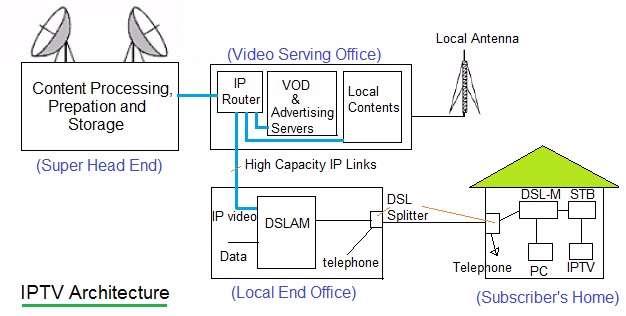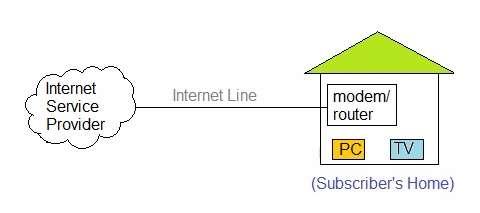IPTV vs. Internet TV: Key Differences Explained
Advertisement
This article breaks down the distinctions between IPTV (Internet Protocol Television) and Internet TV, highlighting their respective architectures, advantages, and disadvantages.
IPTV Explained

Figure 1: IPTV System Architecture
IPTV relies on a completely new infrastructure for signal delivery. The process begins at a “super head end,” a facility responsible for receiving national and international channels. Here, content is organized, stored, and prepared for distribution.
Local content is often mixed in with the received channels. Web data and voice services are then combined with the IP video streams before being distributed to subscribers. Essentially, IPTV requires a dedicated infrastructure to support the delivery of IPTV-based packets to subscribers.
Internet TV Explained

Figure 2: Connectivity of Internet TV
Unlike IPTV, Internet TV doesn’t require any new or dedicated infrastructure. It leverages the existing internet broadband connection already in place for subscribers.
Video content, along with other web data, is transmitted in the form of IP packets. These packets are received at the subscriber’s end via a modem/router, enabling viewing on desktop PCs or Wi-Fi-enabled TVs.
IPTV vs. Internet TV: A Detailed Comparison
The following table summarizes the key differences between IPTV and Internet TV:
| Features | IPTV | Internet TV |
|---|---|---|
| About the Technology | Uses a private infrastructure managed by the IPTV service provider. Packets follow dedicated lines distributed by IPTV providers. | Uses existing public internet infrastructure managed by ISPs. IP packets are transmitted over the internet using TCP/UDP protocols. |
| Applications | Unique features include video on demand, time shifting of programs, multiple programs on the same display, etc. | All applications available through internet protocols, including music, live video streaming, and internet browsing. |
| Installation | Requires an IPTV STB (Set-Top Box) and IPTV-compliant television sets. | Does not require separate STBs; an existing modem/router is usually sufficient. Often used on PCs, but also on TVs with Wi-Fi. |
| Advantages/Disadvantages | • Uses dedicated connections, maintaining privacy and security. • Delivers high-quality content. | • Uses the public internet, so privacy is not maintained and it is not as secure. • Content quality can vary significantly depending on bandwidth and traffic. |
| Cost | More costly, including monthly charges and service-specific/download charges. | Often freely available, utilizing downloads readily available for viewing. |
Advertisement
 RF
RF





